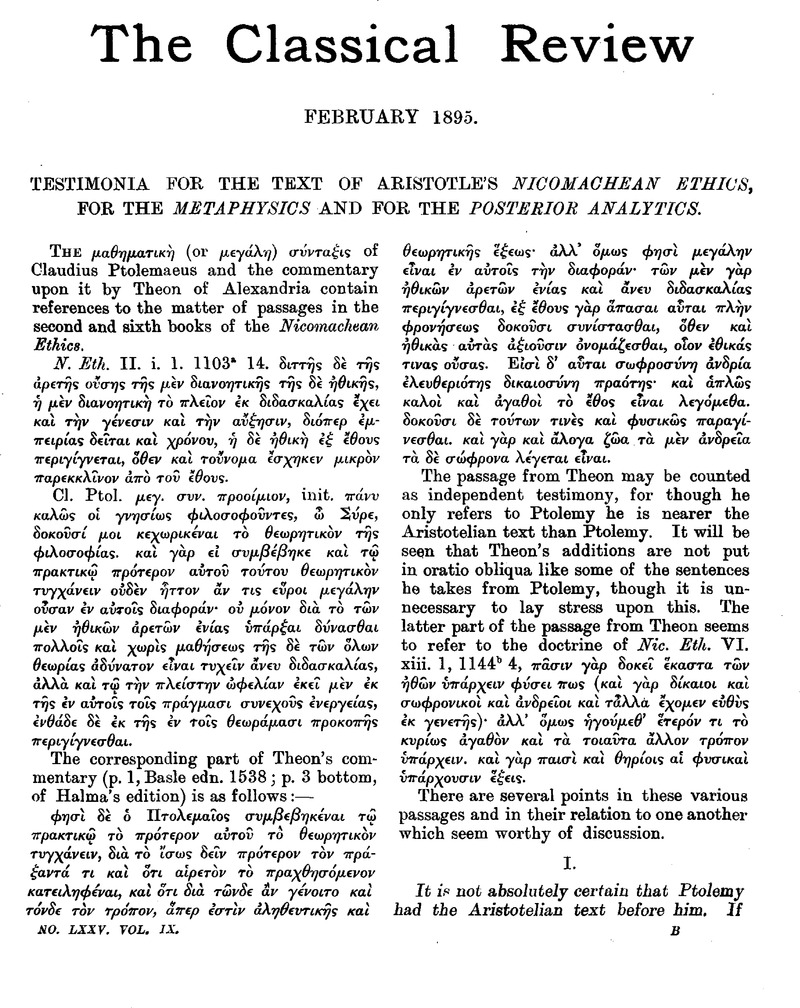No CrossRef data available.
Article contents
Testimonia for the Text of Aristotle's Nicomachean Ethics, for the Metaphysics and for the Posterior Analytics
Published online by Cambridge University Press: 27 October 2009
Abstract

- Type
- Review Article
- Information
- Copyright
- Copyright © The Classical Association 1895
References
page 2 note 1 Here two questions may be asked. Is any instance known where a disputed book is quoted in antiquity under the title Eudemian Ethics? Does any quotation of the matter of the disputed books poiut to a version different to the extant version? As far as the list goes which is prefixed to Susemihl's edition (cf. also Fritzsche's) the answer to both questions seems to be in the negative. And it is worthy of note that the undisputed Eudemian books are sometimes quoted under their title ‘Eudemian,’ while the disputed books are quoted as Aristotle, Aristotle's Ethics, or the Ethics, or as the Ethics with the number of the book given as it is in the Nicomachean version, and not as in the Eudemian, or lastly with the definite title of Nicomachean Ethics.
page 2 note 2 The two passages, though contiguous, are distinguished in the above because there are peculiarities in the form of the second which suggest that it may be a later addition to the first. If this were so, it might account for the apparently inaccurate use of πιστεουσι for πστανται (τ μν οὐ πιστεουσι οἱ νοι λλ λγουσι) : for notwithstanding the wide sense of πιστεειν, this is just a ease where it ought to be distinguished from πστασθαι. The difficulty is removed by Imelmann's ingenious emendation (τμν πιστεουσιν οἱ νοι λλοις λγουσιν) : but the form of the received text is somewhat confirmed by Nie. Eth. VII. iii. 8, 1147a 18—22.
page 3 note 1 The text has ![]() . The correction is due to Barocius (cit. Friedlein) and seems obviously right, for the phrase corresponds to ξ λαττνων τς κ προσθσεως in the original.
. The correction is due to Barocius (cit. Friedlein) and seems obviously right, for the phrase corresponds to ξ λαττνων τς κ προσθσεως in the original.
page 3 note 2 In the same treatise of Proclus are three references to the Ethics: in p. 32, 1. 4 (Fried.) to Nic. Eth. 1095a 1, in p. 33, 1. 25 and p. 192, 1. 10 to Nic. Eth. 1094b 26. These do not occur in the above mentioned list of testimonia, though they come from a book of which there is a modern edition with a copious index; it may be suspected therefore that the list is capable of a good deal of extension. There are many references to Plato in the same book, and especially to the Timaeus, which are interesting sometimes as confirming curious expressions in Plato's text, or as contributing to interpretation (cf. e.g. Fr. 20, 10, Tim. 53 C; Fr. 52, 20, Tim. 42 A; Fried. 108, 10, Tim. 42 E; Fr. 291, 1, Tim. 37 B; Fr. 382, 3, Tim. 53 C). It contains references to passages later than the part of the Timaeus at which Proclus' commentary ceases. The Commentary is of course often quoted, but the editors of the Timaeus seem to have made little or no use of this other source. Stallbaum quotes it perhaps not more than once, and then through the medium of Boeckh, and on a historical point, not for the text.


